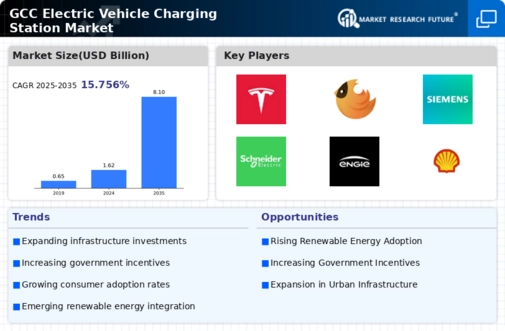Government Incentives and Subsidies
Government initiatives aimed at promoting electric mobility play a crucial role in shaping the electric vehicle-charging-station market. In the GCC, various governments are implementing incentives such as tax breaks, rebates, and subsidies for both consumers and businesses investing in EV infrastructure. For instance, some countries in the region have allocated substantial budgets to support the installation of charging stations, with investments reaching up to $500 million in recent years. These financial incentives not only encourage the adoption of EVs but also stimulate the growth of the charging station market. As governments continue to prioritize sustainability and reduce carbon emissions, the electric vehicle-charging-station market is likely to benefit from ongoing support and funding.
Rising Demand for Electric Vehicles
The increasing adoption of electric vehicles (EVs) in the GCC region is a primary driver for the electric vehicle-charging-station market. As consumers become more environmentally conscious, the demand for EVs is projected to rise significantly. According to recent data, the number of registered EVs in the GCC is expected to grow by over 30% annually through 2025. This surge in EV ownership necessitates a corresponding expansion in charging infrastructure. The electric vehicle-charging-station market must adapt to this growing demand by providing accessible and efficient charging solutions. Furthermore, as more manufacturers introduce new EV models, the market for charging stations is likely to expand, creating opportunities for investment and development in this sector.
Corporate Sustainability Initiatives
Many corporations in the GCC are increasingly adopting sustainability initiatives, which include the transition to electric vehicles and the establishment of charging infrastructure. Companies are recognizing the importance of reducing their carbon footprint and are investing in electric vehicle fleets. This shift is likely to drive demand for the electric vehicle-charging-station market as businesses seek to provide charging solutions for their employees and customers. Reports indicate that corporate investments in EV infrastructure could exceed $200 million by 2026. As organizations align their operations with sustainability goals, the electric vehicle-charging-station market stands to gain from this corporate commitment to green practices.
Urbanization and Infrastructure Development
Rapid urbanization in the GCC is driving the need for enhanced infrastructure, including charging stations for electric vehicles. As cities expand and populations grow, the demand for efficient transportation solutions increases. The electric vehicle-charging-station market is responding to this trend by integrating charging facilities into urban planning and development projects. For example, major cities are incorporating charging stations in public parking areas, shopping centers, and residential complexes. This strategic placement of charging infrastructure is essential to accommodate the anticipated rise in EV usage, which is projected to reach 1 million units by 2030 in the region. Urbanization thus serves as a catalyst for the electric vehicle-charging-station market, fostering a more sustainable urban environment.
Technological Innovations in Charging Solutions
Technological advancements in charging solutions are significantly influencing the electric vehicle-charging-station market. Innovations such as fast-charging technology and smart charging systems are enhancing the efficiency and convenience of charging stations. In the GCC, the introduction of ultra-fast charging stations is expected to reduce charging times to under 30 minutes, making EVs more appealing to consumers. Furthermore, the integration of renewable energy sources into charging infrastructure is gaining traction, aligning with the region's sustainability objectives. As technology continues to evolve, the electric vehicle-charging-station market is likely to experience growth driven by these advancements, which improve user experience and operational efficiency.
















